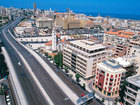Masterpieces belonging to controversial former Sotheby's owner A. Alfred Taubman went on show in Hong Kong Friday, touted as the most valuable private collection ever offered at auction.
Sotheby's estimates the 500 works will fetch U.S.$500 million -- they include Modigliani's "Portrait de Paulette Jourdain", as well as pieces by Picasso, Degas, Willem de Kooning and Mark Rothko.
 Full Story
Full Story
Egyptian authorities promised Thursday they will move quickly to get new radar equipment needed to search for Queen Nefertiti's tomb amid a new theory it could be in an alleged, hidden chamber behind King Tutankhamun's tomb in the famed Valley of the Kings.
The theory, presented this summer by British Egyptologist Nicholas Reeves, speculates that King Tut, who died at the age of 19, may have been rushed into an outer chamber of what was originally Nefertiti's tomb.
 Full Story
Full Story
The Vatican's increasingly high-profile cricket club has set the date for a highly symbolic first match against an all-Muslim team from Britain, organizers said Thursday.
In a series of matches this month, the St. Peter's cricket club, made up of mostly South Asian Rome-based seminarians and priests, will also take on a team from Pope Francis's home town of Buenos Aires and get a chance of revenge against a Church of England XI.
 Full Story
Full Story
The Association for the Promotion and Exhibition of the Arts in Lebanon (APEAL) announced the launch of a design competition for a new modern and contemporary art museum in the heart of Beirut, Lebanon.
 Full Story
Full Story
Assemble, the architectural collective shortlisted for this year's Turner Prize, reckon their nomination has launched a fresh debate about the state of contemporary art in Britain.
The London-based group has blurred traditional boundaries between art and design with its redevelopment plans for 10 Victorian houses in the run-down Toxteth district of Liverpool, northwest England.
 Full Story
Full Story
Orson Welles' personal manuscripts for "Citizen Kane," including the film's final revised shooting script, brought over $102,000 at auction.
The three screenplays were offered by Profiles in History on Tuesday. They illustrate the evolution in the creation of the classic masterpiece.
 Full Story
Full Story
Indian police said Wednesday they had arrested six people after a 50-year-old Muslim man was beaten to death over rumors he had eaten beef, a taboo in the Hindu-majority nation.
Mohammad Akhlaq was dragged from his house on the outskirts of the capital and attacked by around 100 people on Monday night, a police officer told Agence France Presse.
 Full Story
Full Story
A German art historian was named Tuesday as the next director of the British Museum, becoming the first foreigner to head the prestigious London institution in 150 years.
Hartwig Fischer, 53, who is currently director general of the Dresden State Art Collections in eastern Germany, will take up the post in the first half of 2016.
 Full Story
Full Story
A comic saga of a creative writing professor and his letters of recommendation has won the Thurber Prize for American Humor.
Author Julie Schumacher received $5,000 and a crystal plaque for winning with "Dear Committee Members." She was honored Monday at the New York comedy club Carolines on Broadway.
 Full Story
Full Story
Standing before the majestic gold, ochre and white frescos of Tutankhamun's tomb, British archaeologist Nicholas Reeves on Monday passionately defended his daring theory that Nefertiti is buried in a secret chamber.
With the help of a sophisticated radar, Reeves aims to prove Nefertiti is buried there in a hidden chamber of the young pharaoh's underground tomb that long hid the most fabulous treasure ever discovered in Egypt.
 Full Story
Full Story



